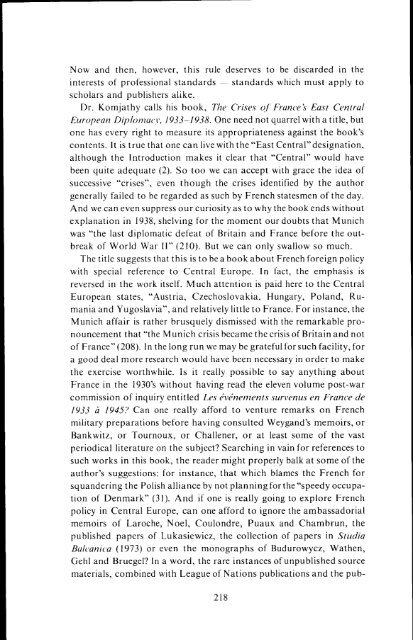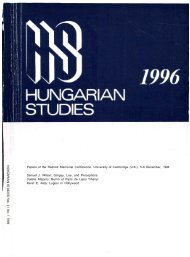The Canadian-American Review of Hungarian Studies - Vol. 4 ... - EPA
The Canadian-American Review of Hungarian Studies - Vol. 4 ... - EPA
The Canadian-American Review of Hungarian Studies - Vol. 4 ... - EPA
You also want an ePaper? Increase the reach of your titles
YUMPU automatically turns print PDFs into web optimized ePapers that Google loves.
Now and then, however, this rule deserves to be discarded in theinterests <strong>of</strong> pr<strong>of</strong>essional standards — standards which must apply toscholars and publishers alike.Dr. Komjathy calls his book, <strong>The</strong> Crises <strong>of</strong> France's East CentralEuropean Diplomacy, 1933-1938. One need not quarrel with a title, butone has every right to measure its appropriateness against the book'scontents. It is true that one can live with the "East Central" designation,although the Introduction makes it clear that "Central" would havebeen quite adequate (2). So too we can accept with grace the idea <strong>of</strong>successive "crises", even though the crises identified by the authorgenerally failed to be regarded as such by French statesmen <strong>of</strong> the day.And we can even suppress our curiosity as to why the book ends withoutexplanation in 1938, shelving for the moment our doubts that Munichwas "the last diplomatic defeat <strong>of</strong> Britain and France before the outbreak<strong>of</strong> World War II" (210). But we can only swallow so much.<strong>The</strong> title suggests that this is to be a book about French foreign policywith special reference to Central Europe. In fact, the emphasis isreversed in the work itself. Much attention is paid here to the CentralEuropean states, "Austria, Czechoslovakia, Hungary, Poland, Rumaniaand Yugoslavia", and relatively little to France. For instance, theMunich affair is rather brusquely dismissed with the remarkable pronouncementthat "the Munich crisis became the crisis <strong>of</strong> Britain and not<strong>of</strong> France" (208). In the long run we may be grateful for such facility, fora good deal more research would have been necessary in order to makethe exercise worthwhile. Is it really possible to say anything aboutFrance in the 1930's without having read the eleven volume post-warcommission <strong>of</strong> inquiry entitled Les evenements survenus en France de1933 a 1945? Can one really afford to venture remarks on Frenchmilitary preparations before having consulted Weygand's memoirs, orBankwitz, or Tournoux, or Challener, or at least some <strong>of</strong> the vastperiodical literature on the subject? Searching in vain for references tosuch works in this book, the reader might properly balk at some <strong>of</strong> theauthor's suggestions: for instance, that which blames the French forsquandering the Polish alliance by not planning for the "speedy occupation<strong>of</strong> Denmark" (31). And if one is really going to explore Frenchpolicy in Central Europe, can one afford to ignore the ambassadorialmemoirs <strong>of</strong> Laroche, Noel, Coulondre, Puaux and Chambrun, thepublished papers <strong>of</strong> Lukasiewicz, the collection <strong>of</strong> papers in StudiaBalcanica (1973) or even the monographs <strong>of</strong> Budurowycz, Wathen,Gehl and Bruegel? In a word, the rare instances <strong>of</strong> unpublished sourcematerials, combined with League <strong>of</strong> Nations publications and the pub-
















